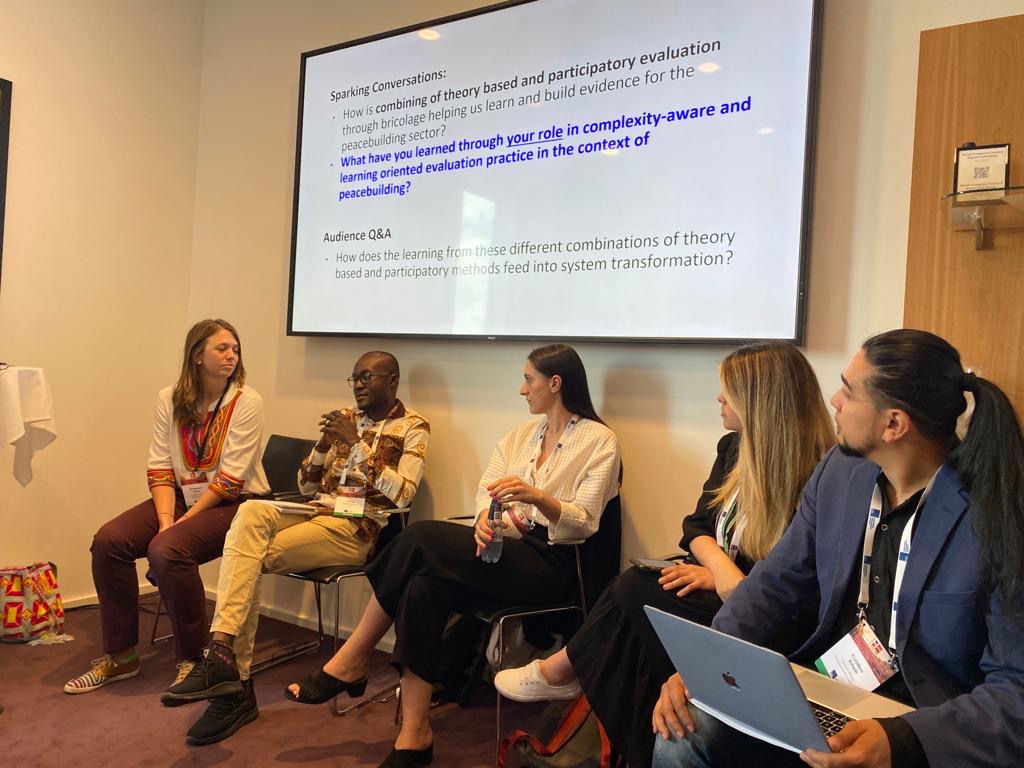Editor’s Note: This guest blog was co-written by members of the Inclusive Rigour Co-Lab: Marina Apgar, Ángela Báez-Silva Arias, Aisalkyn Botoeva, Helene Bradburn, Edwin Cubillos, Steff Deprez, Alamoussa Dioma, Tiffany Fairey, Stephen Gray, Livia Rohrbach and Leslie Wingender.
In 2021, as the world was facing COVID lockdowns, anxieties and isolation, a group of us from varied learning and evaluation backgrounds—academics, practitioners, peacebuilders—connected with each other. Our lives and work spanned different corners of the globe: Mali, South Sudan, Colombia, Myanmar… But despite the diversity of our projects and contexts, we encountered similar obstacles. Our core belief was in the power of participatory approaches, trusting those directly affected by our projects to have critical insights into their impact. This perspective, however, often clashed with a prevailing emphasis on quasi-experimental designs such as randomised controlled trials, led by external, “objective” evaluators who considered participants more like subjects of study. It led us to ponder: How could we foster evaluations that were both rigorous and genuinely participatory? How do we break away from this false dichotomy?
Our discussions were not confined to professional musings; they were an opportunity to learn from one another, to understand the depths of our diverse experiences and expertise. This process of getting to know each other, respecting each other’s backgrounds, and valuing each other’s contributions was as significant as the work itself. Together, we sought to promote an alternative, richer understanding of rigor, influenced by the work of Chambers, Preskill and Lynn, and others. We were on a mission to bridge the perceived gap between methodological soundness and deep inclusivity – but in the process, we built a community.
At PeaceCon@10 and the European Evaluation Society (EES) conferences, in 2021-22, we first floated our ideas to the wider world. It was not about showcasing a finished product but sharing our journey and the lessons learned along the way from our projects : from community-led peacebuilding in rural Mali, to revitalising peace councils through systemic action research in Colombia, to emerging young peacebuilding leader networks in South Sudan. We were crafting a framework that reflected our common realisations — integrating methodological bricolage and iterative design to ensure learning-focused evaluations remained responsive to ever-changing contexts, needs, and voices.
But it wasn’t until June 2022, when we all found ourselves in Copenhagen for the EES conference that the magic really happened. Being in the same space, engaging in real-time discussions, we experienced a profound realization of how similarly we experienced not only challenges but also created solutions across our varied contexts. This shared experience in Copenhagen was pivotal; it crystallized our resolve for our framework to address these challenges head-on. We refined its three main components: ensuring evaluations truly mattered to those they were meant for, including the right voices in the process, and flexibly combining methods to fit changing learning needs in a dynamic context. And crucially, we recognized the importance of an “enabling environment”—the political, team dynamics, and abilities that make such an investment in this type of evaluation possible. This meeting was not just about sharing ideas; it was a turning point that set the direction for our collaborative efforts.
After Copenhagen, we dedicated a year to sharing our experiences and framework at other fora, including another session at EES and at the American Evaluation Association (AEA). This period of sharing was crucial for refining our thoughts and expanding our collective knowledge. It was also a time for documenting our process; we meticulously compiled our experience developing our framework, its theoretical underpinnings and an illustration of its pertinence in three cases studies into an article. Today, we are excited to announce that this article has been published in the journal Evaluation. This publication marks a milestone for us as a collective, and we hope it can be used as a resource by colleagues close and far, who seek to harness the transformative potential of rigorous, participatory evaluation and learning.
At the end of 2023, we were fortunate enough to gather in Bogotá for a workshop that felt like coming home. With our article as a springboard, we dove deeper into our framework, asking ourselves hard questions about what we might be missing and where we could stretch further. This gathering was not just about reflection; it was a forward-looking endeavor, setting the stage for our 2024 agenda. It was there that we decided to truly put our framework to the test, off the page and into the field. We are ready for the messy, beautiful process of applying our framework to real-world projects.
We are thus transitioning into the Inclusive Rigour “Co-Lab”, a name that reflects our commitment to collaborative and inclusive learning and evaluation work. But beyond the name, it’s the ethos of our group that defines us. We are continuously seeking new experiments and discussions for 2024-25, not just to refine and expand our framework but to also enrich our collective understanding and, hopefully, spur others into action.
Reflecting on our journey, it’s clear that the development of our framework was as much about the process as the outcome. The relationships forged, the mutual respect developed, and the shared vision we nurtured are the true foundations of the Inclusive Rigour Co-Lab. Our story is one of collaboration, reflection, and learning.
As we step into this next phase of our journey as a Co-Lab, we are excited to engage beyond our group. We’ve created videos in English, French, and Spanish to introduce peacebuilders and evaluation practitioners to our framework, and are on the lookout for projects where our framework can make a real difference. Have a lead or a case that could benefit from a participatory, inclusive evaluation approach? Curious about our work and want to know more? Reach out and join us in this endeavor to transform evaluation into a tool for genuine engagement and understanding. Together, let’s put our ideas into action.
